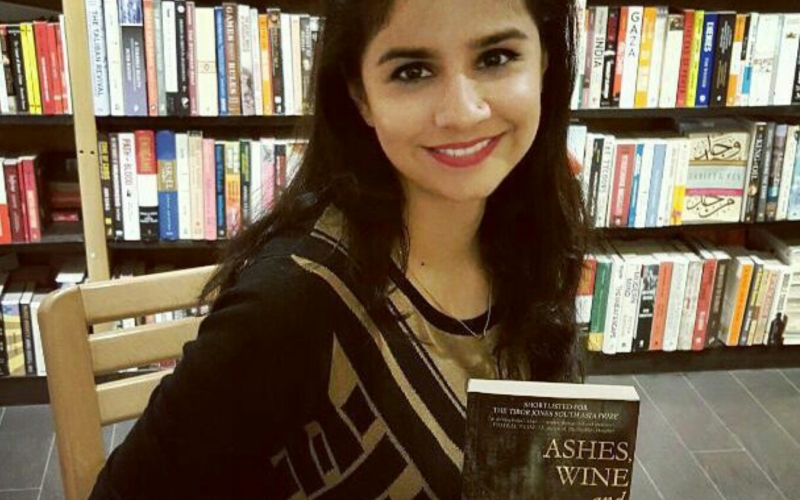By Rimsha Ali Shah.
“There are no plans, just people fooling themselves by attempting to design their fates and futures. It makes them feel invincible, even if it’s for a transient period of time.”
― Kanza Javed, Ashes, Wine and Dust
She began writing at the age of 17 and by 21 had her debut novel nominated for the Tibor Jones South Asia Prize 2013, making her the youngest Pakistani writer nominated that year. Now a published writer at the age of 24, Kanza Javed is a promising new addition to the literary niche of Pakistan. Javed is also an alumna of the Study of the U.S. Institute for Student Leaders Program and a part of the Pakistan-U.S. Alumni Network (PUAN). We sat down with her to talk about her inspiration and experiences as an author.
What was the inspiration behind “Ashes, Wine and Dust”?
As a child, I liked to pretend that I lived a double life: one in the cosmopolitan city of Lahore where my parents migrated, and the second one in my grandparents’ village. Both places were different not only in terms of resources and geography, but also in regards to their stories. Whenever I was in the village, I began writing down everything I heard: the stories of tailors, gardeners, nannies. They assumed because I was a child that I could not understand, so they shared their perils and tribulations with me. It was not until I lost my grandmother that these stories cemented into something concrete. It was the first time that I was confronted with a tragedy. My sadness was pervasive and I realized I had to write in order to heal.
You started writing at the age of 17. How did you manage to maintain the motivation to continue to work towards publishing your book?
First of all, it was never my motive to get published; I just had a story in my mind and I was growing restless. I had a strong urge to encapsulate everything that was bothering me. I knew I had to write it down, and do something about it.
To me, writing has always been therapeutic, so I began journaling episodes and touching moments. Gradually, I gave birth to a character and I began following her in my head. Eventually, I crafted other characters, and after a few months I had what seemed like a coherent plotline. At the same time, I read avidly. Unfortunately, I found that the more I read, the more I compared myself to the greats like Woolf, Faulkner, and Morrison, and I became more reluctant and self-conscious about my own writing. I wondered how I could ever be anything remotely close to what they were.
At 21, I exposed myself to South Asian Literature and discovered distinguished writers who wrote about the cities, characters, and situations I was familiar with and could relate to; their memories and recollections made sense to me. Writing suddenly became less daunting and I told myself I would rather fail than not try at all.

Javed during the book reading of Ashes, Wine and Dust
You have also been to the U.S. on an exchange program. How much did you draw from your own experiences for this novel?
My experience studying in Massachusetts and Arizona and interacting with first-generation immigrant families who had moved to Amherst and Tempe in the 1970’s and 1980’s in search of a better life was very fascinating and left quite an impression. There is a narrative strand in the novel that encapsulates the immigrant experience and deals with themes of physical and emotional disorientation and displacement often encountered by first-generation immigrants.
Recently, you toured the U.S. again through the University Partnership Program. With the release of your book around the same time, how would you describe the response you received?
It was quite a fortunate coincidence; my book was released at the same time I was in Philadelphia reading a paper entitled “Pakistani Immigrant Writings in the US.” During this time, in spring 2015, I also audited a Master’s of Fine Arts (MFA) workshop with Melissa Pritchard at Arizona State University (ASU). My classmates had read Indian writers but were not familiar with any literary works from Pakistan. I realized it would be an interesting exercise to debut my work to my fellow classmates. The Virginia G. Piper House for Creative Writers at ASU organized a book reading and discussion, which was an incredibly enriching experience.
I vividly recall the discussion afterwards on strong female characters in contemporary Pakistani novels and the desire of the societal institutions to gift women with a “code book.” During the book-signing, a student from Texas told me how much she could relate to the story. Literature is universal; our longings are universal. You never know whose heart you touch with your words.

Ashes, Wine and Dust by Kanza Javed
What advice would you like to give youngsters, like yourself, who have a passion for writing?
Read avidly. Study everything. Be open minded
Write something you would wish to read yourself.
Who is your favorite author and what are you presently reading?
I am obsessed with Nadeem Aslam. He is a genius.
What lies ahead for the author Kanza Javed? Are you working on any other manuscripts?
Presently, I am working on a short story for a literary magazine that will launch in Lahore next year.
Order your copy today: http://www.amazon.com/ASHES-WINE-DUST-Kanza-Javed/dp/8183861342

